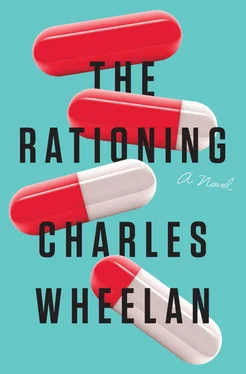Of course, many people did act, just not in ways that made the situation any better. One reality we overlooked before the crisis went public is that the bulk of the nation’s Dormigen supply was unsecured. It was a drug with no recreational value, like aspirin or antibiotic lotion. In most hospitals, the Dormigen was in places easily accessible by all: in the examining rooms, at the nurses’ station, in hallway cabinets, and so on. In the immediate hours after the Outbreak became public, doctors and nurses and pharmaceutical reps and warehouse attendants and anyone else with access to the drug realized that they were potentially in possession of a lifesaving resource that would soon disappear. We had done nothing to secure the supply. A truck driver in Virginia was rolling along I-95 when he heard the first reports of the Outbreak on the radio. He had left a hospital supply warehouse in Georgia two days earlier. On a hunch, he pulled off the highway and parked his eighteen-wheeler in the far corner of a truck stop. He slid open the back door, revealing ninety-seven cases of Dormigen—a cargo that was now more valuable than heroin. The truck later turned up empty in Pennsylvania. The Dormigen, like so much of the supply, was gone—sold on one of the black markets that popped up everywhere. The Outbreak Inquiry Commission subsequently calculated that roughly 17 percent of the nation’s Dormigen supply was purloined in the twelve hours after the crisis became public.
I ARRIVED AT THE CNN STUDIO JUST AFTER SUNRISE. THE morning sun was reflecting sharply off the shiny exterior of the building as the black sedan dropped me at the entrance. News of the Outbreak was palpable. The street was mostly deserted. Many of the stores and shops had handwritten signs on the door saying they would not be opening DUE TO CIRCUMSTANCES or UNTIL FURTHER NOTICE. Later, when we had made some headway convincing the public that Capellaviridae does not “spread,” stores and shops began to open as an act of solidarity and strength. Starbucks was the first company to issue a statement saying that all of its stores would be open, as “this is a time for Americans to come together, not to rush away from one another in fear.” It was an important step in our efforts to stem the panic. Still, some 40 percent of Starbucks employees called in sick in those first few days.
The CNN building was abuzz with activity, in striking contrast to the eerie, semi-deserted street outside. A producer was waiting for me in the lobby. She, like most of the other people scurrying across the lobby, was wearing a white face mask. “I know you’ll understand if I don’t shake your hand,” she said.
I laughed involuntarily, causing her to take a half step back. “It’s not even the right wrong response,” I said.
“What do you mean?” she asked, perhaps offended but also deferring to me as “the expert.”
I explained, “Most of us are already carrying Capellaviridae , so there is no point in trying to protect ourselves from the virus. But even if for some strange reason you were not infected, the virus is transmitted by a biting insect, so there is no point in wearing a face mask. See? It’s the wrong wrong response.”
“Say that on camera,” she said. “That’s perfect. We need to get you into makeup.” She used a badge to swipe me through security and pushed me gently toward a bank of elevators. An elevator door opened and we stepped inside. Two other people joined us, both wearing face masks. They spread out to the corners of the elevator, keeping us all as far apart as possible. “Eleven. This is us,” the producer said. “Have you ever been on television?” she asked.
“No,” I said.
“Just have a conversation. You’ll do great.”
Makeup was a small, harshly lit room with several barber-type chairs. “He’s yours,” the producer said, handing me off to a very large man in a tight white T-shirt sipping coffee. “I need him back in five.”
“Five?” the makeup attendant exclaimed with mock indignation. “I’ve got a lot of work to do.” As if to put a finer point on it, he turned to me and said, “Get in the chair, you’re a mess.” My suit was wet, as was my hair. My face was damp with perspiration. “Where to begin?” he asked. I pulled the tie out of my pocket; it was creased at two-inch intervals from having been wadded up for hours.
“Should I put this on?” I asked.
“No! No, that is not going to work,” he said, taking the wrinkled tie from my hand and literally tossing it aside. “You’ll be fine without it. But we need to get that jacket dry or it’s going to reflect on camera.” He used a blow dryer on both my jacket and my hair. Then, with striking efficiency, he applied makeup to the shiny places on my face and combed my hair, spraying it with something to hold it in place. The producer appeared in the doorway holding a clipboard and looking slightly anxious.
“Okay, I need him,” she said. The producer steered me around a corner into a large studio with banks of desks arrayed across the open floor. At the far end of the room, I could see the familiar CNN news desk illuminated by bright lights. The room was a hive of activity, with reporters and producers scurrying back and forth off camera. The familiar Linda Schuham was sitting at the anchor desk, interviewing someone whom I did not recognize. There was a large map of the United States illuminated behind the anchor desk; both Schuham and her guest pointed at the map on occasion. An older man with a long gray ponytail stepped beside me and said in a raspy voice, “I’m going to mike you up.” I could smell tobacco on his breath as he clipped a microphone on my lapel, wrapped the extra cord around a small transmitter, and then slid it inside my jacket pocket. “You don’t need to do anything,” he said. “I’ll turn it on from here. Just remember to give it back to me when you’re done.” The White House had been emphatic about the three points I needed to make: (1) no terrorist attack; (2) the virus does not spread; (3) we have the capacity to keep the country healthy. The last point was clearly debatable, but panic was not going to do anyone any good. I would do my best to make the situation feel under control as Americans woke up to the Capellaviridae news.
The Communications Director had given me a pep talk as I rode to the studio in the sedan. “Stick to the talking points,” he said. “Do you know what that means?”
“I want to make sure I get those points across,” I answered.
“No. That means you are not going to say anything else. Those three points, over and over. That’s it. If Linda Schuham asks you what your favorite color is, you say, ‘What’s important to understand right now is that there has not been a terrorist attack.’ Got it?”
It seemed easy enough until I found myself gazing across the room at the news desk, with cameras surrounding it from all angles. The producer said, “We’re going to break in thirty seconds and then I’ll take you up there.” I did one more mental checklist of the points I needed to make. The producer must have seen the concentration on my face, because she said, “Don’t overthink it. It’s just a conversation. You’re going to have about three minutes.”
“Three minutes?” I asked, incredulous. It had never dawned on me that I would have so little time.
“That’s actually long for a news segment at this hour,” she said. “Remember, follow Linda’s lead and have a conversation.”
Of course, that was the opposite of what the Communications Director had advised me, I thought, recalling his final admonition: “I don’t care what the fuck she asks you. Don’t even listen to the question. When her lips stop moving, you give the answer you want to give.” The program went to break. The guest stood up to leave, a different producer escorting him off the set as I was steered into the bright lights. A young woman rushed up to Linda Schuham, handing her a bottle of water while conferring about something. The producer guided me to my seat on the set. I felt awkward and stiff compared to what seemed like the fluidity and ease of everyone around me. The lights were bizarrely bright, giving everything on the set a fake plastic feel. Linda Schuham shared a laugh with the woman who had brought her the water and then turned to me and said in a surprisingly chipper voice, “Thanks so much for coming on. Just explain to me what’s happening like you were talking to your mother.”
Читать дальше












